(精品)2017年秋新人教版八年级上册英语Unit5课文重难点
八年级英语上册-人教版-Unit 5 说课稿
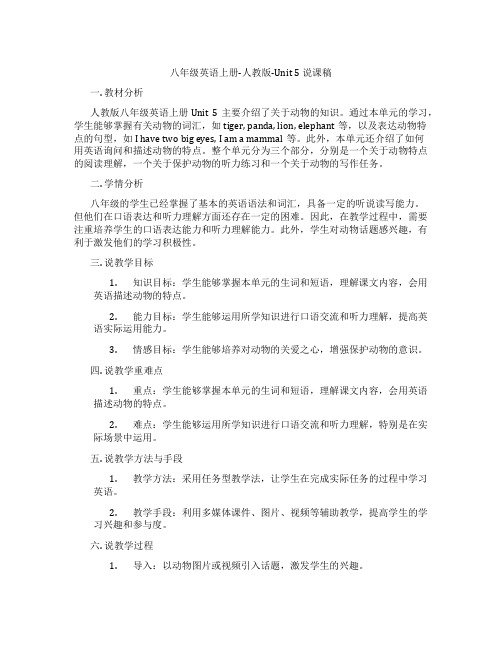
八年级英语上册-人教版-Unit 5 说课稿一. 教材分析人教版八年级英语上册Unit 5主要介绍了关于动物的知识。
通过本单元的学习,学生能够掌握有关动物的词汇,如tiger, panda, lion, elephant等,以及表达动物特点的句型,如I have two big eyes, I am a mammal等。
此外,本单元还介绍了如何用英语询问和描述动物的特点。
整个单元分为三个部分,分别是一个关于动物特点的阅读理解,一个关于保护动物的听力练习和一个关于动物的写作任务。
二. 学情分析八年级的学生已经掌握了基本的英语语法和词汇,具备一定的听说读写能力。
但他们在口语表达和听力理解方面还存在一定的困难。
因此,在教学过程中,需要注重培养学生的口语表达能力和听力理解能力。
此外,学生对动物话题感兴趣,有利于激发他们的学习积极性。
三. 说教学目标1.知识目标:学生能够掌握本单元的生词和短语,理解课文内容,会用英语描述动物的特点。
2.能力目标:学生能够运用所学知识进行口语交流和听力理解,提高英语实际运用能力。
3.情感目标:学生能够培养对动物的关爱之心,增强保护动物的意识。
四. 说教学重难点1.重点:学生能够掌握本单元的生词和短语,理解课文内容,会用英语描述动物的特点。
2.难点:学生能够运用所学知识进行口语交流和听力理解,特别是在实际场景中运用。
五. 说教学方法与手段1.教学方法:采用任务型教学法,让学生在完成实际任务的过程中学习英语。
2.教学手段:利用多媒体课件、图片、视频等辅助教学,提高学生的学习兴趣和参与度。
六. 说教学过程1.导入:以动物图片或视频引入话题,激发学生的兴趣。
2.呈现:展示本课的生词和短语,让学生朗读并理解含义。
3.讲解:讲解课文内容,让学生理解动物的特点和保护动物的重要性。
4.练习:进行口语练习,让学生用英语描述动物的特点。
5.听力:播放听力材料,让学生回答相关问题。
6.输出:让学生写一篇关于保护动物的短文。
人教英语八年级上册Unit5重点单词讲解

人教英语八年级上册U n i t5重点单词讲解本页仅作为文档页封面,使用时可以删除This document is for reference only-rar21year.MarchUnit5 知识点 v. 介意,智力,精神1)mind doing sth. 2) never mindmind 常用句型1)I don’t mind opening the window2) Would you mind (sb./sth.) doing sth3)Would you mind if sb. do/does sth回答上面两个句型时表示不介意用:Not at all/ Certainly not/ Of course not.表示介意用I'm sorry, but …/Sorry you'd better not ./I'm afraid you can't.Eg. 1.—Would you mind my/me sitting here?—Of course not.2. —Would you mind my/me smoking here?— I'm afraid you can't.新闻,消息(不可数)a piece of newsNo news is good newsv. 站立,忍受, 位于某处can't stand sth./ can 't stand sb. doing something.I can't stand soap operas.2) She was too weak to stand.3) An old Apple tree once stood here.4. educational adj.education n.educate v.educator n. 教育者Eg. My mother is an educator, she always lets us read some educational books and educate us to pay more attention to education.5. plan n./v.plan to do sth. /plan on doing sth. 计划做某事make a plan. 制定计划They plan to visit the museum this Sunday.2)When do you plan on going to Paris.3)It's very important to make a plan before we doeverything.6. discuss v.discussion n.1)have a discussion with sb.2)have a discussion about sth.7. joke n.1) play a joke on sb.Eg. He always plays a joke on him.2) tell a joke.Eg. He likes telling a joke.8. hope v./n.hopeful adj.hopeless adj.Eg. 1) I'm full of hope for the future.2) I hope to visit my aunt tomorrow.3) You are hopeful, don't be helpless.9. happen v.sth happens to sb. 某发生了某事sb. happen to do sth. 某人碰巧做某事It happened that... 碰巧……Eg. 1) What happened to him yesterday.2) I happened to meet him on the street yesterday.3) It happened that I was out when he called.happen 偶然发生take place 有计划发生Eg. 1) A car accident(事故)happened last night.2)The class meeting will take place on Friday. 10. mean v. 意思,意味着 adj. 吝啬的meaning n. 意思,意义meaningful adj. 有意义的meaningless adj. 毫无意义的、意思不明确的Eg. 1)This is a meaningless question.2)Mr Li is a mean man3)I know your meaning. You mean that staying at home all day long is meaningless and that looking fora job is meaningful.11. act v./n. 扮演,表演actor 男演员 actress 女演员action n. 行动12. famous --- well-knownbe famous for 因为……而出名be famous as 作为……而出名be famous to 为……所熟知Eg.Edison is famous as an inventor(发明家) in theworld and he is famous for his inventions(发明), he is famous to the people all over the world.13. Luck n.lucky adj. –unlucky adj.luckily adj. – unluckily adj.Eg. 1)Good luck.2)You are a lucky dog.3)Luckily, he met a nice man.4)Unluckily, he didn't pass the exam.14. success n.succeed v.successful adj.successfully adv.)He is a successful man.2)He finished tasks successfully.3)He succeeded in learning to ride a bike.4)Failure is the mother of the success.15. rich adj. 富有的,肥沃的,丰富多彩的,油腻的)She lives a rich life.2)China is rich in land3)Vegetables grow well in the rich soil.4)Eating rich food makes people get fat easily16. lose v. 失去,丢失,输掉lose touch with 和某人失去联系lose one’s way 迷路lose weight 减肥lose heart 失去信心,灰心Eg. 1)My father lost his keys yesterday morning.2)He lost his way in the forest.3)He lost the game so he was sad.4)He lost touch with his father.5)You're not heavy, don't lose weight.6)He lost heart because he got bad grades again.17. be ready to do sth. 准备好做某事,愿意做某事be ready for sth. 为某事做好准备Eg. 1) Are you ready for your school trip.2)I'm ready to help you with your English.18. come out 出版,出现,盛开,为人所知)The book came out in 2020.2)The rain stopped and the sun came out.3)The flowers came out early this year.4)Please believe that the truth will come out one day.19. in the +年份s/’s 在……世纪……年代1) in the 1980s/1980’s 在二十世纪八十年代2) in the 1900s 二十世纪。
八年级英语上册Unit5教学重点归纳
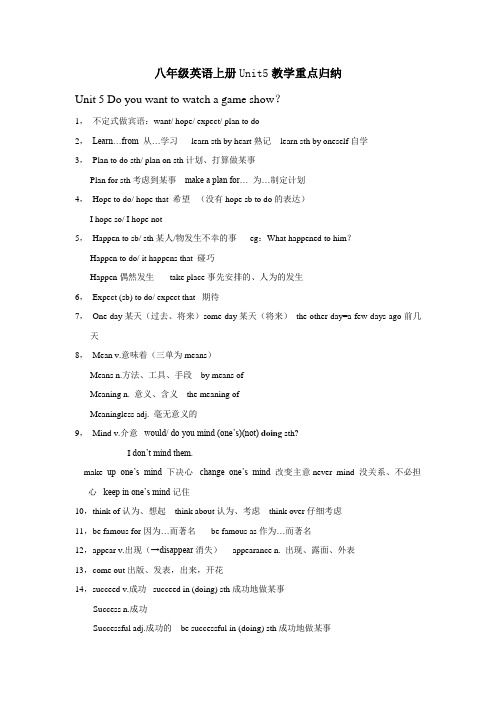
八年级英语上册Unit5教学重点归纳Unit 5 Do you want to watch a game show?1,不定式做宾语:want/ hope/ expect/ plan to do2,Learn…from 从…学习learn sth by heart熟记 learn sth by oneself自学3,Plan to do sth/ plan on sth计划、打算做某事Plan for sth考虑到某事make a plan for… 为…制定计划4,Hope to do/ hope that 希望(没有hope sb to do的表达)I hope so/ I hope not5,Happen to sb/ sth某人/物发生不幸的事eg:What happened to him?Happen to do/ it happens that 碰巧Happen偶然发生 take place事先安排的、人为的发生6,Expect (sb) to do/ expect that 期待7,One day某天(过去、将来)some day某天(将来)the other day=a few days ago前几天8,Mean v.意味着(三单为means)Means n.方法、工具、手段 by means ofMeaning n. 意义、含义 the meaning ofMeaningless adj. 毫无意义的9,Mind v.介意would/ do you mind (one’s)(not) doing sth?I don’t mind them.make up one’s mind下决心change one’s mind改变主意 never mind没关系、不必担心keep in one’s mind记住10,think of认为、想起 think about认为、考虑 think over仔细考虑11,be famous for因为…而著名 be famous as作为…而著名12,appear v.出现(→disappear消失)appearance n. 出现、露面、外表13,come out出版、发表,出来,开花14,succeed v.成功succeed in (doing) sth成功地做某事Success n.成功Successful adj.成功的 be successful in (doing) sth成功地做某事Successfully adv.成功地15,reason结论性原因 cause起因excuse借口16,danger n.危险be in great danger处于极大危险中 out of danger脱离危险endanger v. 使遭遇危险,危及dangerous adj. 危险的endangered adj.有灭绝危险的17,luck n.运气—lucky adj.幸运的(→unlucky不幸的)—luckily adv. 幸运地18,be ready to do sth愿意做某事get ready to do sth准备去做某事 get ready for为…做准备19,a pair of+ n复数做主语,谓语动词用单数 eg:A pair of glasses is enough for me. 20,Take one’s place to do sth代替某人做某事21,do a good job干得好22,wear 表状态,接服装、手套、眼镜、香水等put on 表动作,接服装(→take off)dress 表动作,接sb/ oneself get dressed穿衣 dress up盛装打扮try on试穿(动副结构)try it on(be) in+颜色或衣服 eg:The girl in a red coat is my sister.。
人教版八年级上册英语Unit5知识点梳理及语法讲义(学生版)
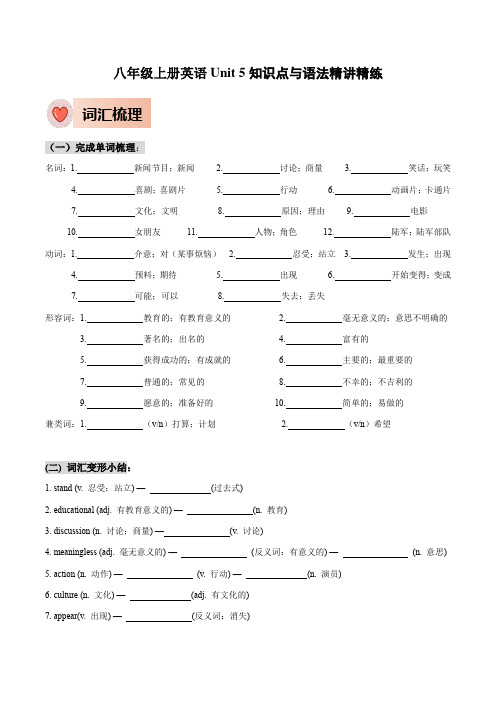
八年级上册英语Unit 5知识点与语法精讲精练词汇梳理(一)完成单词梳理:名词:1. 新闻节目;新闻 2. 讨论;商量 3. 笑话;玩笑4. 喜剧;喜剧片5. 行动6. 动画片;卡通片7. 文化;文明8. 原因;理由9. 电影10. 女朋友11. 人物;角色12. 陆军;陆军部队动词:1. 介意;对(某事烦恼) 2. 忍受;站立 3. 发生;出现4. 预料;期待5. 出现6. 开始变得;变成7. 可能;可以8. 失去;丢失形容词:1. 教育的;有教育意义的 2. 毫无意义的;意思不明确的3. 著名的;出名的4. 富有的5. 获得成功的;有成就的6. 主要的;最重要的7. 普通的;常见的8. 不幸的;不吉利的9. 愿意的;准备好的10. 简单的;易做的兼类词:1. (v/n)打算;计划 2. (v/n)希望(二) 词汇变形小结:1. stand (v. 忍受;站立) — (过去式)2. educational (adj. 有教育意义的) — (n. 教育)3. discussion (n. 讨论;商量) — (v. 讨论)4. meaningless (adj. 毫无意义的) — (反义词:有意义的) — (n. 意思)5. action (n. 动作) — (v. 行动) — (n. 演员)6. culture (n. 文化) — (adj. 有文化的)7. appear(v. 出现) — (反义词:消失)8. bee(v. 变成) — (过去式)9. successful(adj. 成功的) — (adv. 成功地) — (n. 成功)— (v. 成功)10.unlucky(adj. 不幸的) — (反义词:幸运的)unluckily(adv. 不幸地) — (反义词:幸运地)11. lose(v. 失去;丢失) — (过去式)12. simple(adj. 简单的) — (adv. 简单地)【练一练】用所给词的适当形式填空1.The book is very ___________(education). You can learn a lot from it.2.The students are having a ____________(discuss) about these TV programs.3.The boy ____________(stand) up and then ran away.4.Tom and Jerry is a ____________ (success) cartoon. People of all ages like it.5.It’s time for us to put the plan into ____________ (act).6.We shouldn’t spend much time on _____________ (meaning) things every day.7.A bus ____________(appear)in the corner when I was planning to take a taxi.8.Guo Jingjing worked hard and ____________(bee)an excellent athlete(运动员).9.He was so unlucky that he fell off the bike yesterday. ____________, he wasn't hurt badly.(lucky)10.When I got to the city, I____________(lose)my way.(三) 短语攻关:肥皂剧查明;弄清动作影片准备好(做某事)装扮;乔装打扮代替;替换干得好访谈节目从……学到出现;出版世界各地认为打算做某事不能忍受做某事1.What do you think of talk shows? 你认为访谈节目怎么样?【用法详解】 重点:“What do you think of...?”相当于“How do you like...?”或“How do you feel about...?”意为“你认为……怎么样?”,常用来询问对方对某事/某人的看法。
最新版人教版八年级英语上册unit5知识点重难点
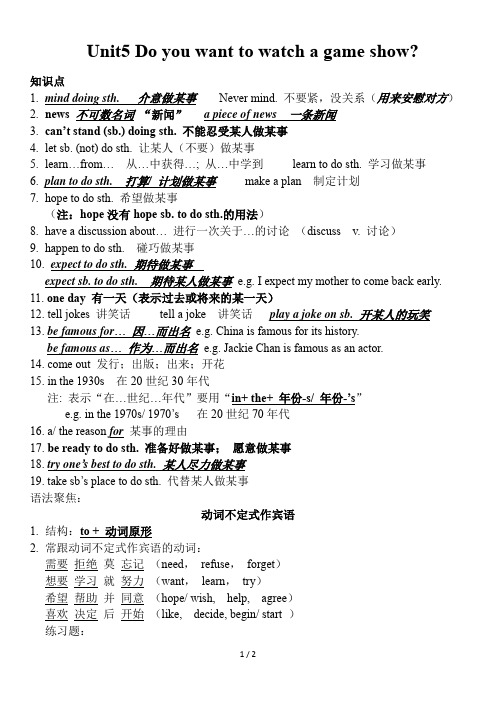
Unit5 Do you want to watch a game show?知识点1.mind doing sth. 介意做某事Never mind. 不要紧,没关系(用来安慰对方)2.news 不可数名词“新闻” a piece of news 一条新闻3.can’t stand (sb.) doing sth. 不能忍受某人做某事4.let sb. (not) do sth. 让某人(不要)做某事5.learn…from…从…中获得…; 从…中学到learn to do sth. 学习做某事6.plan to do sth. 打算/ 计划做某事make a plan 制定计划7.hope to do sth. 希望做某事(注:hope没有hope sb. to do sth.的用法)8.have a discussion about…进行一次关于…的讨论(discuss v. 讨论)9.happen to do sth. 碰巧做某事10.expect to do sth. 期待做某事expect sb. to do sth. 期待某人做某事e.g. I expect my mother to come back early.11. one day 有一天(表示过去或将来的某一天)12. tell jokes 讲笑话tell a joke 讲笑话play a joke on sb. 开某人的玩笑13.be famous for…因…而出名e.g. China is famous for its history.be famous as…作为…而出名e.g. Jackie Chan is famous as an actor.14. come out 发行;出版;出来;开花15. in the 1930s 在20世纪30年代注: 表示“在…世纪…年代”要用“in+ the+ 年份-s/ 年份-’s”e.g. in the 1970s/ 1970’s 在20世纪70年代16. a/ the reason for某事的理由17. be ready to do sth. 准备好做某事;愿意做某事18. try one’s best to do sth. 某人尽力做某事19. take sb’s place to do sth. 代替某人做某事语法聚焦:动词不定式作宾语1.结构:to + 动词原形2.常跟动词不定式作宾语的动词:需要拒绝莫忘记(need,refuse,forget)想要学习就努力(want,learn,try)希望帮助并同意(hope/ wish, help, agree)喜欢决定后开始(like, decide, begin/ start )练习题:1. —Did he tell you ______ joke?—No. He told me ______ interesting story.A. an; aB. a; aC. an; anD. a; an2. —Why do you love him?—I have no ______ for it. It is only a feeling.A. dreamB. habitC. reasonD. question3. Mrs. Qin isn’t here today. I’ll take her place ______ the park.A. cleaningB. cleanC. to cleanD. cleans4. —Your cousin can paint well. —Yes. He ______ his paintings.A. is famous forB. is famous asC. is good forD. is good with5. Lucy is so slow. I can't stand ______ for her so long.A.wait B.waiting C.to wait D.waited6. You can’t expect ______ a new language in a few months.A. learnB. learnedC. learningD. to learn7. What do you plan ______ during the holidays?A. doingB. to doC. doD. to doing8. —Did you ______ what was in that room at last? —Yes. It was a cat.A. come outB. find outC. bring outD. blow out9. Why do you like watching Who’s Still Standing ? — Because I can learn a lot it.A. fromB. ofC. forD. with10. His book ______ and he ______ famous.A.come out;become B.came out;becomesC.comes out;became D.came out;became11. Beijing is famous ______the Great Wall.A.as B.by C.to D.for12. —How about your basketball match last week?—Oh,we ______.We were all happy.A.did badly B.did a good job C.did good D.did a good work 13. What do you think of this book?—I don’t like it. I think it’s ______ (meaning).14. Mo Yan is a ______ (success) writer in China.15. The students are having a ______ (discuss) about how to learn English well.16. 王老师病了。
人教版八年级上册英语unit 5 知识点梳理

人教版英语八上Unit 5 知识点一.短语归纳1. think of 认为2. learn...from... 向......学习3. the answers to the questions 问题的答案4. find out 查明;弄清5. go on 发生6. around the world 世界各地7. have a discussion about 就......进行讨论8. come out 出版,发行9. in the 1930s 在20世纪30年代10. one of ......之一11. try one’s best 尽某人最大的努力12. a symbol of... ......的象征13. Chinese culture 中国文化14. dress up 装扮;乔装打扮15. take one’s place 代替;替换16. do a good job 做得好17. something enjoyable 令人愉快的东西二.知识点梳理1. What do you think of talk shows? 你觉得访谈节目怎么样?show在此处用作可数名词,意为“(电视或广播)节目”。
Do you want to watch a game show? 你想看游戏节目吗?【拓展】①show用作名词,还可以表示“表演;展览”。
There is a painting show tonight. 今晚有画展。
②show作及物动词,意为“给......看;展示”。
show sb. sth. = show sth. to sb. 给某人看某物Can you show me your ruler? = Can you show your ruler to me? 你能给我看看你的尺子吗?2.I don’t mind them. 我不介意它们。
mind在此处作及物动词,意为“介意”,后面可以接名词、代词或动词-ing形式。
初中英语人教版八年级上册Unit 5

Unit 5 Do you want to watch a game show?Section A 1 (1a-2d)一、教学目标:1. 语言知识目标:1) 能掌握以下单词:sitcom, news, soap, cartoon, educational, plan, hope, find out, discussion, stand, happen, may, expect能掌握以下句型:① What do you want to watch?② What do you think of talk shows?③ I can’t stand them.④ I don’t mind them.⑤ I like/love them. / I don’t like them.2) 能了解以下语法:动词不定式结构做动词的宾语;后面接动词不定式做宾语的动词。
3) 学会陈述自己的看法;学会谈论自己的喜好。
2. 情感态度价值观目标:学会谈论流行文化,了解各类电视和电视节目的名称和自己的喜欢。
注意引导学生们形成正确的文化观念,大力培养学生们的跨文化意义,形成自己独立的个性。
二、教学重难点1. 教学重点:1) 学习掌握各类电视和电视节目的名称。
2) 掌握动词不定式结构做动词的宾语;了解后面接动词不定式做宾语的动词。
2. 教学难点:掌握动词不定式结构做动词的宾语;了解后面接动词不定式做宾语的动词。
三、教学过程Ⅰ. Lead-in学生们根据图片提示学习各类电视节目并且练习运用What do you think of…?Ⅱ. Languague points and new wordsWhat do / does sb. think of ...?与How do / does sb. like ...?同义,用来询问对某事物或某人的观点或看法,意为“某人认为……怎么样?”;回答时可用love, like, not mind, not like, not stand等来表达对某事物或某人的好恶程度。
人教版八年级英语上册Unit 5知识点整理汇编

人教版八年级英语上册Unit 5知识点整理汇编Unit 5 Can you come to my party? 知识点详解一、词汇精讲1、 suresure常用于口语中,为说话人较有把握的肯定回答,意为“当然可以,愿意”,相当于certainly或yes。
— May I use your pen? 我能用一下你的钢笔吗?— Sure. 当然可以。
【拓展】sure的其他用法:(1)祈使句“Be sure+不定式”表达说话人向对方所提出的要求,意为“务必,千万”。
Be sure to give it back in time. 务必要及时归还。
(2)“be sure+不定式”还可意为“一定,肯定”,往往表示说话人的一种推测或判断,主语可以是人,也可以是物。
It’s sure to rain tomorrow. 明天一定会下雨。
(3)be sure of/about表示主语“相信”或“对…有把握”,后接名词、代词或动词-ing形式,主语必须是人。
He is sure of success.= He is sure that he will succeed. 他自信会取得成功。
(4)“be sure+从句”表示“肯定,有把握”,主句的主语必须是人。
I’m sure who he is. 我知道他是谁。
2、情态动词can 的用法can是最常用的情态动词,其后接动词原形,否定形式为can’t。
(1)can表示有能力做或能够发生,有“能,会”的意思。
I can run fast. 我能跑得快。
She can speak Japanese. 她会说日语。
注意:can在表示“能力”时可与be able to互换使用,be able to 有更多的时态,常被用来表示can所不能表示的将来时或完成时。
They will be able to run the machine on their own in three months.三个月后,他们能自己操作这台机器。
(完整word版)新人教版八年级上册Unit5英语讲义

Unit 5 Do you want to watch a game show? 【基础词汇】39 愉快的40 放松的41 令人兴奋的42 无聊的43 有趣的44 忘记做某事45 著名的标志46 在美国文化中47 80多年前48 在20世纪30年代49 准备做某事50 有许多困难51 在1900年11月14日52 其中一个主要的原因53 比如【语法点睛】询问对某人某事的看法及评价常用问句句型:1.What do/does+主语+think of...?How do you like...?……认为……怎么样?What do you think of comedies?你认为喜剧怎么样?What does Sue think of the TV show?苏认为这个电视节目怎么样?2.What/How about...?……怎么样?What about the book?这本书怎么样?常用答语:(1)可以用动词like,love,can't stand,don't mind构成以下句子:I like/love it.我喜欢它。
I don't mind it.我不介意它。
I don't like it.我不喜欢它。
I can't stand it.我不能忍受它。
(2)也可以用形容词interesting,boring等及表示程度的副词very much,a lot,a little等来回答。
I think the book is very interesting.我认为这本书很有趣。
I like it a little.我有点喜欢它。
I think it's a boring film.我认为这是一部无聊的电影。
I like it very much.我非常喜欢它。
【例1】—What do you ______your hometown?—I love it very much.A.look at B.talk aboutC.think of D.like【例2】—What does your sister think of the film?—______.A.She doesn't mind them B.She likes themC.She likes it D.She doesn't like her【例3】—______?—Oh.I can't stand it.A.How about Chinese CookingB.What does your mother think of the bookC.What does your mother like the bookD.What does he think of the bookSection A 2d【课本互动】一、熟读第26页的2d至背诵,合上书本填空。
新人教版英语八年级上册--unit 5 课文重难点讲解

2014八年级上Unit 5 Do you want to watch a game show?Section A1. plan to do sth:We are planning to visit London this summer.2. hope+that(可省略)+宾语从句: I hope (that) you will have a wonderful time there.hope to do sth. 注意:不能用hope sb. to do sth.: (正)They hope to visit Japan next year.(误)They hope them to visit Japan next year.Hope的简略回答: I hope so. I hope not.Wish和hope的差别:wish/hope to do sth. ; wish/hope+that从句。
Wish sb.to do sth. (hope不可这样用): I wish you to go.Hope后不能直接跟名词作宾语,可for+名词,表示可实现在“希望”。
Wish for+名词,表示难实现的“愿望”。
:I wish for success. I hope for a car.Wish可接双宾语: We wish you a Happy New Year.3. What do you think of.....?=How do you like....?4. Mind+名词,动名词,从句, (不可接不定式): Would you mind my opening the window?Change one’s mindKeep...in mindNever mindMake up one’s mind5. have a discussion.6. Follow: A.动词:Millie followed my advice and everything goes well now.B.形容词: They went there again the following day.=They went there again the next day.7. Stand忍受:stand to do sth. Stand doing sth.She can’t stand being kept waiting.Could you stand to go there again tomorrow?I can’t stand that new student.8. Expect与look forward to:I’m expecting Tom. 我正等待着汤姆。
八年级(上)新目标英语Unit5每课时备课重难点归纳

Unit5 Do you want to watch a game show?每课时备课重难点归纳Unit5 Section A (1a-2d) P33-34预习及听写内容(纸粘在书上,并用彩色荧光笔在书本上标注)一、单词汉译英1、情景喜剧;2、新闻节目(news不可数);3、肥皂剧(soap opera);4、介意;5、忍受、站立(stand-stood);6、有教育意义的(educate v.-education n.-educational adj.);7、计划(plan--planned);8、希望;9、讨论(discuss-discussion);10、发生;11、预料,期待二、短语和句子1、看游戏节目;2、看脱口秀(watch a talk show=watch talk shows);3、介意某事/介意做某事(mind sth/mind doing sth);4、无法忍受新闻/无法忍受做某事(can’t stand news/can’t stand doing sth);5、从情景喜剧中学到一些很棒的笑话(learn...from...从...学到....);6、看新闻(watch the news);7、希望做某事(hope to do sth);8、关于某事进行一次讨论(have a discussion about sth);9、期待做某事(expect to do sth);10、你认为谈话节目怎么样?还可以,我不介意(看)它们(=How do you like talk shows?);11、因为我希望弄清楚现在世界上正在发生着什么(go on=happen);12、我希望在将来的某一天能成为一名电视台记者(one day=some day)。
Unit 5 Section A (语法-3c) P35预习及听写内容(纸粘在书上,并用彩色荧光笔在书本上标注)一、汉译英1、笑话;2、喜剧(复数comedies);3、今晚(tonight)二、短语和句子1、全世界;2、看电影/看情景喜剧/看新闻/看体育节目/游戏节目;3、想去做(want to do)/希望去做(hope to do)/期待去做(expect to do)/打算去做(plan to do);4、今晚你打算看什么?我打算看《我们过去的日子》;5、你期望从情景喜剧中学到什么?6、你为什么喜欢看新闻?Unit 5 Section B (1a-1d) P36预习及听写内容(纸粘在书上,并用彩色荧光笔在书本上标注)一、汉译英1、毫无意义的(meaning n.--meaningless adj.)(反义词:meaningful);2、行动(act v.-action n.);3、卡通片;4、主题(subject)二、短语和句子(见P100听力原文)1、动作片;2、恐怖电影;3、现在(right now);4、待在家(stay at home);5、有没有一些好的电影正在上映?6、让我们看一下报纸;7、(看)些令人激动的怎么样,比如动作片或恐怖片?8、John想去看脱口秀节目因为它们是令人愉快的。
初中英语人教版八年级上册unit5
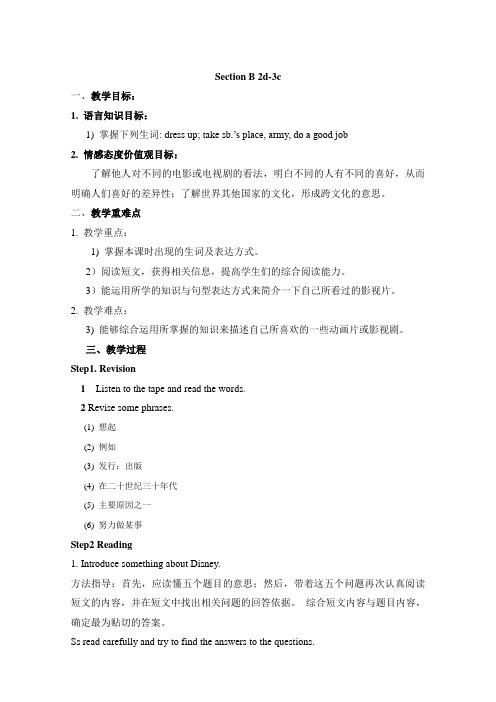
Section B 2d-3c一、教学目标:1. 语言知识目标:1) 掌握下列生词: dress up; take sb.’s place, army, do a good job2. 情感态度价值观目标:了解他人对不同的电影或电视剧的看法,明白不同的人有不同的喜好,从而明确人们喜好的差异性;了解世界其他国家的文化,形成跨文化的意思。
二、教学重难点1. 教学重点:1) 掌握本课时出现的生词及表达方式。
2)阅读短文,获得相关信息,提高学生们的综合阅读能力。
3)能运用所学的知识与句型表达方式来简介一下自己所看过的影视片。
2. 教学难点:3) 能够综合运用所掌握的知识来描述自己所喜欢的一些动画片或影视剧。
三、教学过程Step1. Revision1Listen to the tape and read the words.2 Revise some phrases.(1) 想起__________(2) 例如________(3) 发行;出版_________________(4) 在二十世纪三十年代______________(5) 主要原因之一___________________(6) 努力做某事______Step2 Reading1. Introduce something about Disney.方法指导:首先,应读懂五个题目的意思;然后,带着这五个问题再次认真阅读短文的内容,并在短文中找出相关问题的回答依据。
综合短文内容与题目内容,确定最为贴切的答案。
Ss read carefully and try to find the answers to the questions.Check the answers with the class.Step3. Work on 2dRead the passage again and discuss the questions with a partner.1) What is Mickey Mouse a symbol of? What cartoon character is a symbol of Chineseculture?2) Do you think Walt Disney is a smart man? Why or why not? Do you want to be like him?3) Why did people want to be like Mickey? Do you want to be like Mickey? Why orwhy not?4) Can you think of another cartoon character that is as famous as Mickey? Why is the character popular?T: Read the passage again. This time you should discuss the questions with a partner.方法指导:首先,在短文中找到相关问题的回答依据;然后,与伙伴来讨论一下这个问题,结合自己生活经历回答出这个问题;Let some Ss talk about their answers.Step4. Speaking and WritingUnderline the following phrases in the passage. Write your own sentences or questions using the phrases.think of ___________________________come out __________________________one of the main reasons _____________such as ___________________________was ready to ______________________Remember the words and phrases in the lesson.Step5. Reading3a Fill in the blanks in the movie review. Use the words in the box to help you.Mulan is an ________ ______ movie. It ___________ an old Chinese story. The movie is ______ a village girl, Mulan. She dresses up like a boy and takes her father’s place to fight in the army. I think the actress _______ Mulan’s role well.The other actors are also _________ andthey did a good job in the movie. I _____ Mulan very much. The movie _______ her love for her family, friends and country. If you ______ to watch a movie this weekend and you ______ to see something enjoyable, choose Mulan!1. Read the article about Mulan. Fill in the blanks in the movie review. Use the words in the box to help you.2. 写作指导:首先,阅读短文,整体把握短文大意。
人教版英语八年级上册Unit 5 重难点知识归纳总结
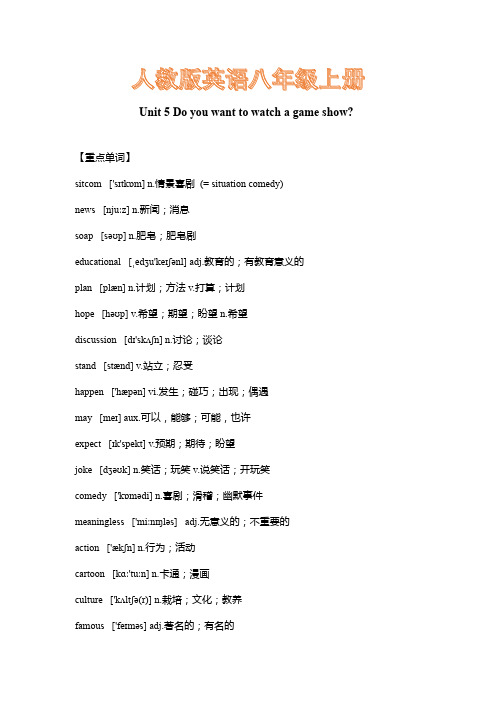
Unit 5 Do you want to watch a game show?【重点单词】sitcom ['sɪtkɒm] n.情景喜剧(= situation comedy)news [njuːz] n.新闻;消息soap [səʊp] n.肥皂;肥皂剧educational [ˌedʒu'keɪʃənl] adj.教育的;有教育意义的plan [plæn] n.计划;方法v.打算;计划hope [həʊp] v.希望;期望;盼望n.希望discussion [dɪ'skʌʃn] n.讨论;谈论stand [stænd] v.站立;忍受happen ['hæpən] vi.发生;碰巧;出现;偶遇may [meɪ] aux.可以,能够;可能,也许expect [ɪk'spekt] v.预期;期待;盼望joke [dʒəʊk] n.笑话;玩笑v.说笑话;开玩笑comedy ['kɒmədi] n.喜剧;滑稽;幽默事件meaningless ['miːnɪŋləs]adj.无意义的;不重要的action ['ækʃn] n.行为;活动cartoon [kɑː'tuːn] n.卡通;漫画culture ['kʌltʃə(r)] n.栽培;文化;教养famous ['feɪməs] adj.著名的;有名的appear [ə'pɪə(r)] vi.出现;出版;显得become [bɪ'kʌm] v.变成;成为rich [rɪtʃ] adj.富有的;富饶的;丰富的successful [sək'sesfl] adj.成功的;圆满的might [maɪt] aux.可能;也许;may的过去式main [meɪn] adj.主要的;最重要的reason ['riːzn] n.原因;理由film [fɪlm] n.电影unlucky [ʌn'lʌki]adj.倒霉的;不幸的;不吉利的lose [luːz] vt.丢失;失败vi.失败ready ['redi] adj.准备好的;乐意的character ['kærəktə(r)] n.个性;品质;人物;simple ['sɪmpl] adj.简单的;朴素的;单纯的;笨的army ['ɑːmi] n.军队;陆军;一大批action movie 动作片【重点短语】1. find out 查出/发现2. be ready to do 愿意迅速做某事3. dress up 装扮/乔装打扮4. take one's place 代替/替换5. do a good job 工作干得好/做得好6. think of 想到/思考7. game show 游戏节目8. learn from 向……学习9. talk show 访谈节目10. soap opera 肥皂剧11. go on 继续12. watch a movie 看电影13. one of… ……其中之一14. try one’s best to =do one’s best to 竭尽全力15. a pair of 一双16. as famous as 与……一样闻名/出名17. look like 看起来像18. around the world 世界各地19. have a discussion about 讨论……20. one day 有一天/某一天21. such as 例如22. a symbol of 一个……的象征/标志23. something enjoyable 快乐的事情24. interesting information 有趣的信息【重点句型】1. Some people might ask how this cartoon animal became so popular.有些人可能会问这个卡通动物是怎样变得如此受欢迎的呢。
- 1、下载文档前请自行甄别文档内容的完整性,平台不提供额外的编辑、内容补充、找答案等附加服务。
- 2、"仅部分预览"的文档,不可在线预览部分如存在完整性等问题,可反馈申请退款(可完整预览的文档不适用该条件!)。
- 3、如文档侵犯您的权益,请联系客服反馈,我们会尽快为您处理(人工客服工作时间:9:00-18:30)。
1. Do you want to watch a game show? 【解析1】want =would like v 想要want a go = have a try 试一试(1) want sth 想要某物I want a pen.(2) want to do sth 想要去做某事I want to go home.(3) want sb to do sth = would like sb to do sth.想要某人做某事I really want __________________(去滑冰) today. ⑴The person who is the earliest will get what he orshe_______(want).⑵The driver wanted_____his car near the roadside but was asked by the police not to. A. parkB. parkedC. to parkD. parking【辨析】watch/read/see/look at “看” 法不同:⑴watch 看电视、看比赛、看表演用; watch TV 看电视`1.—Where is your father?--He ________ the World Cup in the living room. A. is watchingB. watchesC. watchedD. will watchThe TV program Super Brain (最强大脑)is so fantastic thatit is well worth____( watch)⑵read 看书、看报、看杂志用。
read the book 看书⑶see 看电影、看医生用。
see the doctor 看医生⑷look at 看黑板、看地图用。
look at the blackboard 看黑板①______the picture. Can you see the man in the picture? He isn ’t ________ the book. He is ______TV.②_____ the board , child! Read the words on it after me. A. Look B. Look at C. SeeD. Watch【解析3】show ⑴v 出示,展示show sb. sth = show sth to sb. 向某人出示某物show sb. around someplace 带领某人参观⑵ n 演出;节目;表演Lucy showed me her photos = Lucy showed the photos to me. be on show 正在展出fashion show 时装表演game show 游戏节目TV show 电视节目talent show 才艺表演talk show 脱口秀;谈话节目sports show 体育节目①Zhang Xuan showed me her photos and gave me one yesterday. A. passed me B. brought me C. let me see D. made me take. ②I used to _______ with my wife and watch TV movies at home.A. show upB. wake upC. come upD. stay up2. — What do you think of talk show? 你认为访谈节目怎么样?—I don ’t mind them . 我不介意它们。
【解析1】What do you think of …?= How do you like…?你觉得……怎么样?用来提问某人对某事的看法;回答常用句型:I like …very much/ I don ’t like… /I can’tstand … / I don’t mind …等。
①— ____ do you think of the film? — Very interesting. A. What B. Who C. How ②— What do you think of soap operas? — ______. But my mother likes them.A. I like themB. I enjoy themC. I can ’t stand themD. I don ’t agree 【解析2】mind (1)v 介意,反对(2) n 头脑,想法,记忆【句型1】mind doing sth Do you mind opening the door?①— What do you think of bananas? —I don ’t mind _____.A. itB. themC. theirD. its②Excuse me , would you mind ____ your voices down, please?A. to keepB. keepingC. keepD. kept【句型2】--Would you mind (one ’s) doing sth? 你介意做某事吗?(用于委婉的询问或请求别人做某事)【否定】would you mind not doing sth? 【否定回答】①如果不介意(同意): 意思是“允许对方做某事”Oh, no, please/Not at all/Of course not/Certainly not【肯定回答】②如果介意(不同意):意思则是“不让对方做某事Please don ’t …请不要…/ Better not, please请最好不要……/ I ’m sorry, but ……/You ’d better not.(2) n 思想,主意①change one ’s mind 改变某人的主意never mind 不要紧②make one ’s mind to do sth = decide to do sth 下决心做某事The day before yesterday, he made up his mind _ __ (lose) weight. (3). mind sb./形容词性物主代词+doing sth. 介意某人做某事I ’m trying to sleep .Would you mind _____the music? (调低)①—Would you mind ____ the music a little? Don ’t youthink it’s too loud?—Sorry! I’ll do it in a minute.A. turning onB. turning offC. turning upD. turning down②—Would you mind ______ in the dining hall?—Of course not. A. not to smokeB. not smokingC. smokeD. not smoke③—Would you mind_______ the window? It's very hot. —No, not at all. A. openB. to openC. opening④—Would you mind not _____ noise? Alice is sleeping.—Sorry, I didn ’t know. I _____ she was awake.A. make ; think B. making; thought C. making; think D. make ; thought⑤—It is getting cold. W ould you mind _____the window?—Of course not. A. closingB. to closeC. closed6. Because I hope to find out what’s going on aroundworld.因为我希望了解世界各地正在发生的事情。
【解析1】hope v / n 希望(1)hope to do sth. 希望做某事I hope ______ (see) you again.(2)hope +that 从句I hope you may succeed (3)I hope so..我希望是这样(4)I hope not. 我希望不是这样—What’s your dream job, Tom?— I hope _____ a policeman.A. beingB. beC. to beD. done 【解析2】find out 查明;弄清【拓展】 1. find → found →found v寻找(1) find sb. doing sth 发现某人做某事(2) find it + adj. + to do sth 发现做某事很……◆find it difficult/ hard to do sth 发现做某事很困难She found _____ hard to finish the work by herself.A. thatB. it’sC. itD. this 【辨析】find/look for/find out 找(1)find v 找到,强调找到的结果(2)look for 寻找,强调找东西的过程(3) find out 查明,找到,指经过调查,询问等弄清事实的真相The window is broken. Try to_____ who broke it.A. find outB. findC. lookD. look for 【句型3】around the world= all over the world世界各地I hope I can travel _____________(世界各地) one day.4. Find someone who hopes to watch a sitcom . 找出谁希望看情景剧【解析】sitcom ['s?tk?m] n.情景喜剧(= situation comedy) watch sitcom 看情景喜剧comedy n 喜剧;喜剧片(pl) comediesI like to watch _________(情景喜剧) ,what about you?5. Find someone who expects to watch the news.找到谁期待看新闻。
